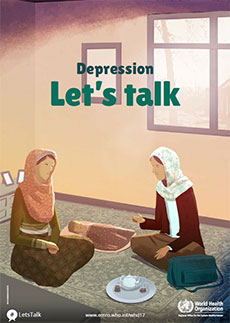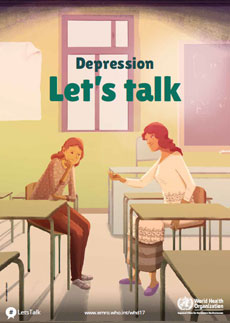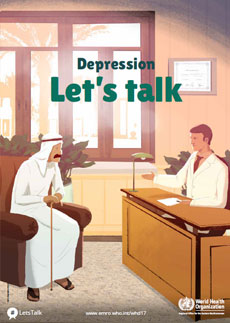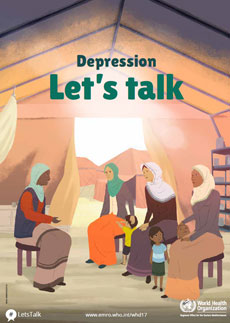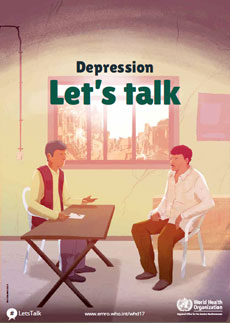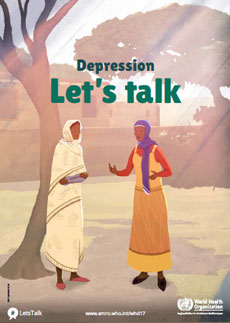Campaign material
Depression:
Let's talk
Campaign material
|
Print version |
Print version |
Print version |
|
At a refugee camp [PDF, 111 kb] Print version |
At a temporary clinic [PDF, 103 kb] Print version |
Print version |
Handouts on depression
Depression: What you should know
Living with someone with depression?
Worried that your child is depressed?
Worried about the future? Preventing depression during your teens and twenties
Wondering why your new baby is not making you happy?
Staying positive and preventing depression as you get older
Campaign messages
Depression:
Let's talk
Campaign messages
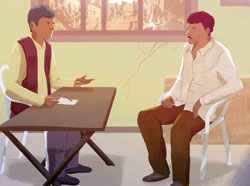
When you live with someone with depression, you can help them recover, but you need to take care of yourself too.
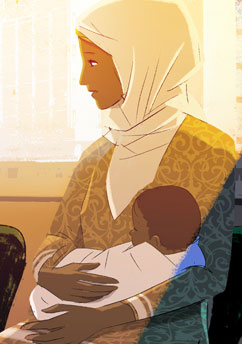
Depression after childbirth is very common. If you think you may be affected, seek help.
Depression can be treated. If you think you have depression, seek help.
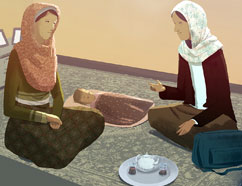
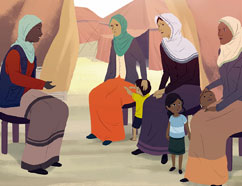
If you feel like life is not worth living, reach out for help. You are not alone. Help is available.

There is a lot that can be done to prevent, and treat, depression in older age.

If you think your child might be depressed, talk to him or her about any worries or concerns, and seek professional help if needed.
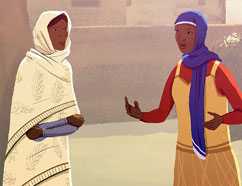
If you know someone who may be considering suicide, talk to them about it. Listen with an open mind and offer your support.

There is a lot that you can do to keep mentally strong. If you feel that you may be heading for depression, talk to someone you trust or seek professional help.
Depression: Let's talk
Depression:
Let's talk
What is depression?
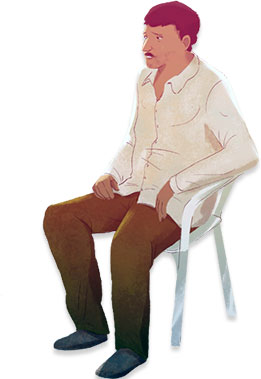 Depression is an illness that makes you feel constantly sad, lose interest in activities you enjoy and makes it difficult to carry out daily tasks.
Depression is an illness that makes you feel constantly sad, lose interest in activities you enjoy and makes it difficult to carry out daily tasks.
Signs of depression include:
loss of energy
change in appetite
sleeping more or less
anxiety
reduced concentration
indecisiveness
restlessness
feelings of worthlessness, guilt, or hopelessness
thoughts of self-harm or suicide.
Can depression affect you?
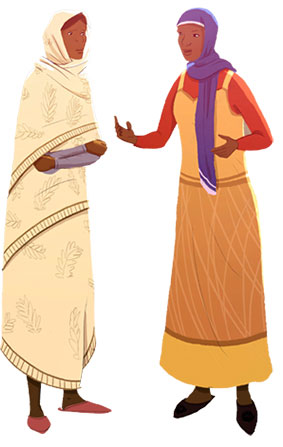 Depression can affect anyone, regardless of age, sex, social status, race or culture.
Depression can affect anyone, regardless of age, sex, social status, race or culture.
If left untreated, depression can affect your relations with family and friends, as well as your activities and daily tasks, and impact your ability to work and earn a living. Depression can be debilitating and even lead to suicide – the second leading cause of death among 15–29-year olds.
Depression is a real illness and should not be ignored or downplayed.
In WHO’s Eastern Mediterranean Region, the number of people living with depression is increasing as a result of growing humanitarian crises, conflicts and displacement. As many as 1 in 5 people are affected by depression and anxiety in these settings.
Dealing with depression
If you think you are depressed seek help.
Talk to people, talking to others about how you feel can help.
Find out what help is available.
Don’t let the stigma around mental illness, including depression, stop you from seeking help.
Just talking about depression with friends, family members, colleagues, professionals or as part of a group in school, work, social settings or through social media can help reduce the stigma associated with this illness.
Let’s fight the stigma and encourage more people with depression to speak out.
Related links








